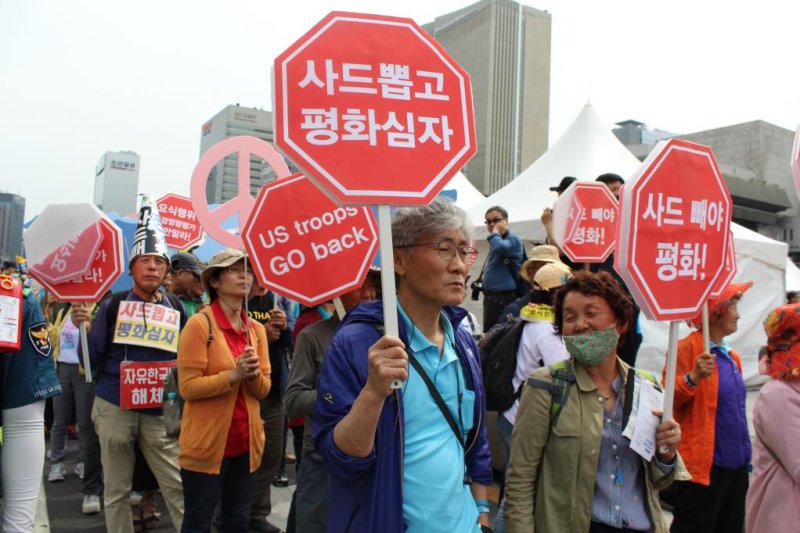1 of 2 | Protesters hold up signs on Saturday in Seoul, calling for peace and the dismantlement of THAAD, an anti-ballistic missile defense system deployed by the United States in South Korea. Photo by Kelly Kasulis/UPI
SEOUL, June 1 (UPI) -- Hundreds of South Koreans protested outside the U.S. Embassy in Seoul's Gwanghwamun Square on Saturday, carrying peace signs, banging on drums and chanting in unison. Their message: They want the promised peace declaration that would end the Korean War -- and they want the United States to loosen its policy against North Korea.
The protest -- organized largely by the Candlelight Peace Promoters Committee -- came almost a year after the June 12 Singapore Declaration between U.S. President Donald Trump and North Korean leader Kim Jong Un, which promised "efforts to build a lasting and stable peace regime on the Korean Peninsula."
"We were one for the entire history of our peninsula, and we've been separated only for the past 70 or so years. That's a very short time compared to our entire history as Koreans," Pastor Kim Jong-su, 64, told UPI after giving a speech at the demonstration. "To end this separation, we need to see mutual, inter-Korean exchanges ... and honestly, I feel that [the United States] is hindering that."
Diplomacy unraveling
Tensions between North and South Korea eased after the Pyeongchang Winter Olympics brought them together last February, and diplomacy progressed when Trump met Kim face to face at the Singapore Summit last June.
But efforts have since stalled. In February, Trump walked away from the Vietnam summit with Kim Jong Un, claiming the North Korean leader wanted all sanctions lifted in exchange for the signing of a second joint declaration.
That's why some South Koreans are protesting:
"The people here are deeply wishing for the peace and reunification of the Korean Peninsula. And after the second U.S.-North Korea summit in Hanoi broke down, we're here to express our disappointment," Yoo Yeong-jae, 57, told UPI. "North Korea took some steps toward denuclearization as they had promised, and the U.S. should react properly to remove sanctions as well as announce an end of the war."
"Last year, North Korea and the U.S. made great progress, and a framework for peace and denuclearization was established. But [at the Vietnam Summit], the U.S. suddenly lost sight of these two things and requested unilateral denuclearization," Kim Jong-su told UPI. "It can't be like this. It can't be about surrendering nuclear weapons first.'"
Call for concessions
Demonstrators like Kim Jong-su and Yoo joined crowds that carried cutouts of a unified Korean Peninsula and called for more cooperative projects between North and South Korea. Many protesters demanded the reopening of the joint Kaesong Industrial Complex, while others wanted a withdrawal of U.S. troops from South Korea.
"It's a very complex political problem, but as Korean nationals, we want peace on the Korean Peninsula," Gwak Eun-seok, 45, said. "Reopening Kaesong and tourism to Mount Kumgang [in North Korea] are steps that move us toward peace."
Most of what the protesters are seeking would require the United States and the United Nations to lift economic sanctions against North Korea. That goes against the United States' traditional denuclearization-first policy, which essentially demands that North Korea surrender its arsenal of weapons before getting any concessions in return.
Even so, Washington is increasingly seeing partial sanctions relief as a viable option for progress, according to C. Harrison Kim, a professor at the University of Hawaii at Manoa and author of Heroes and Toilers: Work as Life in Postwar North Korea.
"In the United States, sanctions are kind of surrounded by different opinions. In Congress and in the State Department, they're generally favored," Harrison Kim told UPI. "But at the same time, there are growing voices on the idea of lifting sanctions ... And, to me, sanctions are somewhat a result of an irrational, kind of war-mongering viewpoint of conservative politics in the U.S."
Counter-protesters
Saturday's protest underscores the divide between South Koreans who believe in engagement with North Korea and those who are against it.
Demonstrators in favor of the peace declaration filled the roads as they made their way toward Seoul's historic Gyeongbokgung Palace, but they were soon followed by several hundred more people who waved American flags and called for a stronger alliance with the United States.
"South Korea must maintain a strong alliance with the United States, and it must consider its national security first," R. Jo, 54, told UPI. "We should continue to be tough on North Korea, because we cannot trust them. We can only trust our allies."















